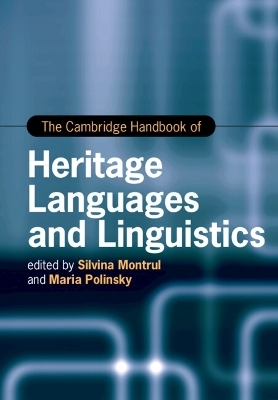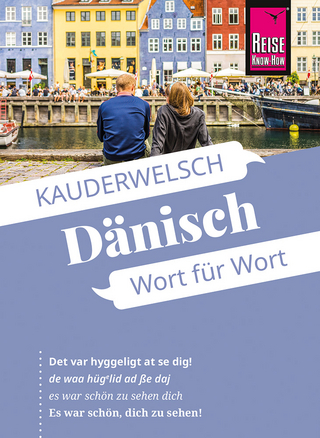
The Cambridge Handbook of Heritage Languages and Linguistics
Cambridge University Press (Verlag)
978-1-108-71999-5 (ISBN)
Heritage languages are minority languages learned in a bilingual environment. These include immigrant languages, aboriginal or indigenous languages and historical minority languages. In the last two decades, heritage languages have become central to many areas of linguistic research, from bilingual language acquisition, education and language policies, to theoretical linguistics. Bringing together contributions from a team of internationally renowned experts, this Handbook provides a state-of-the-art overview of this emerging area of study from a number of different perspectives, ranging from theoretical linguistics to language education and pedagogy. Presenting comprehensive data on heritage languages from around the world, it covers issues ranging from individual aspects of heritage language knowledge to broader societal, educational, and policy concerns in local, global and international contexts. Surveying the most current issues and trends in this exciting field, it is essential reading for graduate students and researchers, as well as language practitioners and other language professionals.
Silvina Montrul is Professor of Linguistics in the Department of Spanish and Portuguese and in the Department of Linguistics at the University of Illinois at Urbana-Champaign. Recent publications include Heritage Language Acquisition (2016) and El bilingüismo en el mundo hispanohablante [Bilingualism in the Spanish-speaking world] (2013). Maria Polinsky is Professor of Linguistics at the University of Maryland, College Park and Director of the National Heritage Research Center at UCLA. Recent publications include Deconstructing Ergativity (2016) and Heritage Languages and Their Speakers (2018).
Introduction – heritage languages, heritage speakers, heritage linguistics Silvina Montrul and Maria Polinsky; Part I. Heritage Languages Around the World: 1. Slavic heritage languages around the globe Bernhard Brehmmer; 2. Heritage languages in Europe Tanja Kupisch; 3. Heritage languages in Southeastern Europe Natalia Pavlou and Kleanthes K. Grohmann; 4. Heritage languages in China Linda Tsung and Lubei Zhang; 5. Heritage languages in Japan and Korea Hyun-Sook Kang and James Hye Suk Yoon; 6. Heritage languages in Israel Natalia Meir, Susan Joffe, Ronald Shabtaev, Joel Walters and Sharon Armon-Lotem; 7. Heritage languages in New Zealand and Australia Corinne Seals; 8. Heritage languages in Canada Naomi Nagy; 9. Asian heritage languages in the United States – Chinese and Hindi language communities Shereen Bhalla, Na Liu and Terence G. Wiley; 10. The vitality of Spanish as a heritage language in the United States Maria M. Carreira; 11. Germanic heritage varieties in the Americas – social and linguistic perspectives Janne Bondi Johannessen and Joseph Salmons; 12. Arabic in North America Abdulkafi Albirini; 13. Heritage languages in South America John M. Lipski; 14. Language attrition and heritage language reversal in returnees Cristina Flores and Neal Snape; Part II. Research Approaches to Heritage Languages: 15. Heritage language research and theoretical linguistics Elabbas Benmamoun; 16. The emergence of heritage language – a case study from Korean William O'Grady and Chae-Eun Kim; 17. Sociolinguistic approaches to heritage languages Andrew Lynch and Netta Avineri; 18. The psycholinguistics of heritage languages Jill Jegerski and Irina Sekerina; 19. Contact linguistics and heritage languages Itxaso Rodríguez-Ordóñez and Lorena Sainzmaza-Lecanda; 20. A narrative-ethnographic approach to research on heritage language development Agnes Weiyun He; 21. Corpus-based methodologies in the study of heritage languages Olesya Kisselev; 22. Current trends and emerging methodologies in charting heritage language grammars Fatih Bayram, Grazia Di Pisa, Jason Rothman and Roumyana Slabakova; Part III. Grammatical Aspects of Heritage Languages: 23. Phonetics and phonology Charles B. Chang; 24. Morphology Michael Putnam, Lara Schwarz and Andrew Hoffman; 25. Syntax Terje Lohndal; 26. Semantics of heritage languages Tania Ionin; 27. Discourse and information structure in heritage languages Oksana Laleko; 28. Pragmatics in heritage languages Irina Dubinina; Part IV. Heritage Language Education: 29. Elementary school heritage language educational options and outcomes Kim Potowski; 30. Community-organized heritage language programs Jin Sook Lee and Huay Chen; 31. Curricular and programmatic language development opportunities for university-level heritage language learners Sara Beaudrie; 32. Instructed heritage language acquisition Melissa A. Bowles and Julio Torres; 33. Issues and practices in community-based experiential learning for heritage speakers in the United States Paola Guerrero-Rodriguez, Adriana Ojeda and Diego Pascual y Cabo; 34. Developing Spanish heritage language biliteracy María Cecilia Colombi; 35. Heritage language assessment Kimi Kondo-Brown; 36. Embracing opportunity in heritage language revitalization Maria Schwedhelm, Kate Stemper and Kendall King; 37. Heritage language planning and policy Terrence G. Wiley.
| Erscheinungsdatum | 30.01.2024 |
|---|---|
| Reihe/Serie | Cambridge Handbooks in Language and Linguistics |
| Zusatzinfo | Worked examples or Exercises |
| Verlagsort | Cambridge |
| Sprache | englisch |
| Maße | 170 x 244 mm |
| Gewicht | 1668 g |
| Themenwelt | Geisteswissenschaften ► Sprach- / Literaturwissenschaft ► Sprachwissenschaft |
| ISBN-10 | 1-108-71999-6 / 1108719996 |
| ISBN-13 | 978-1-108-71999-5 / 9781108719995 |
| Zustand | Neuware |
| Informationen gemäß Produktsicherheitsverordnung (GPSR) | |
| Haben Sie eine Frage zum Produkt? |
aus dem Bereich


